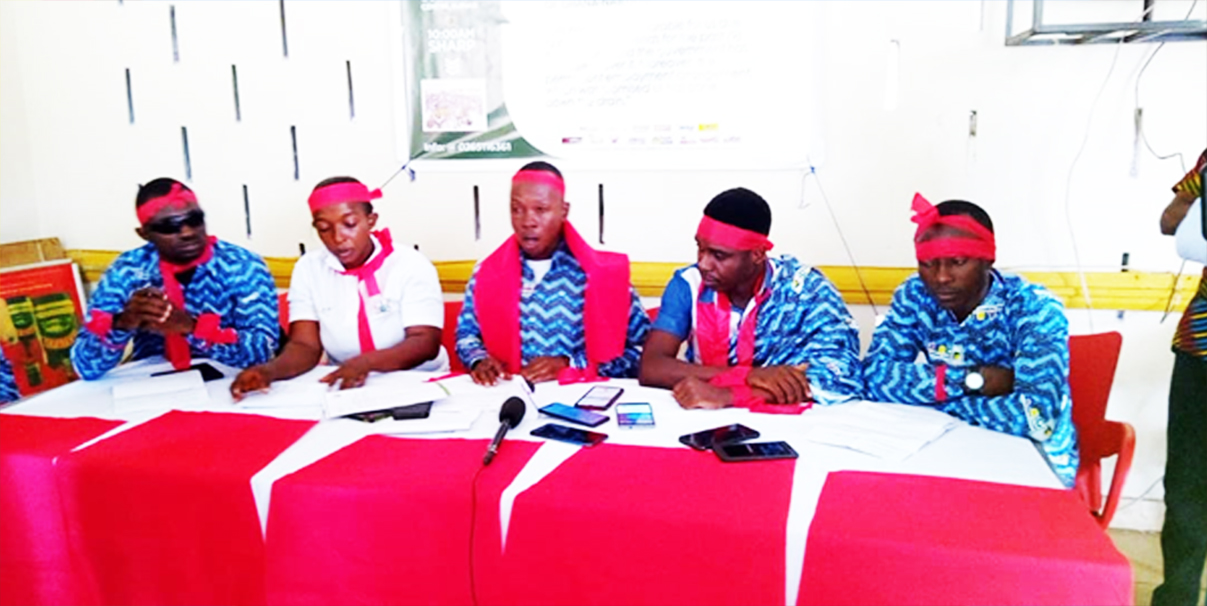The Association of the Nation Building Corps (NABco) is urging the government to fulfill its promises and assurance of providing them with permanent employment. They also want to be paid their allowances, which were in arrears from October 2021 to July 2022.
Dennis Opoku Katakyie, National President of the Association, at a press conference in Kumasi, also pleaded with Otumfuo Osei Tutu II, the Asantehene, to intervene to ensure that their allowances were paid, while steps were taken to engage them in permanent employment promised them by President Akufo-Addo.
The President of the Association expressed worry and disappointment in the President and the Vice President, Dr. Mahmud Bawumia, who promised them permanent jobs on several platforms, but now pushing Mr. Ken Ofori Atta, the Finance Minister, to announce in the Mid-Year Budget that the programme ends on September 2, 2022.
According to him, they had been in the system working for over three years in the various institutions, and wondered why the government wanted to change over to ‘Youth Start’, and thereby impose it on NABco Trainees.
Opoku Katakyie stated that, there were professionals who pursued courses like Education and Colleges of Nursing and Midwifery amongst them, and wanted to be engaged in permanent jobs as promised, since not all NABco Trainees had the idea to do business.
According to the Association, the change from NABCo to ‘Youth Start’ in the face of the nonpayment of their nine months allowances, would not only render the over 64,000 young graduates jobless, but pose a threat to national security.
Meanwhile, the Teacher Trainees’ Association of Ghana (TTAG) has pleaded with the government not to sacrifice the welfare for the current economic and financial crisis in the country.
In their own words: “The innocent teacher trainee should not be used as a sacrificial lamb” to the overbearing economic hardship of the country by denying them of their allowances.”
They said the allowances paid to the teacher trainees with feeding grants as a component for the various Colleges of Education, was aim at easing the huge financial burden on teacher trainees. Meanwhile, the allowances have still been in arrears for over seven months, thereby compounding the financial burden of teacher trainees.
The President of TTAG, Jonathan Dzunu, addressing the Association’s 26th General Assembly, dubbed “Teacher Education and Professionalism:
The Present and Future,” at Hohoe in the Volta Region last week, said with the growing population of Ghana, more teachers would be needed and any policy decision with the tendency to bring a reduction in their admission into the Colleges of Education, would not be countenanced and tolerated.
Already, he said, some government agencies responsible for teacher professionalism, motivation and others had lost touch with reality and had, therefore, neglected the plight of the trainees, who form the bedrock of the country’s educational system.
“Looking at the current economic hardship in the country, you can imagine the difficulty students are going through; life on campus without allowance has become very unbearable for us,” he lamented. “Meanwhile, food shortages are likely to hit the colleges soon, as a result of non-payment of allowances.
The principals are complaining that the suppliers are not ready to supply them with food items, because they owe them; a tough situation for the Principals.”
Licensure Examination
Mr. Dzunu said available data showed that about 128,493 candidates had sat for the Ghana Teacher Licensure Examination since its introduction three years ago, and 88,061 (69%) have passed. He added that so far about 84 candidates had written the exam five times, and 372 had written it four times, but were yet to pass.
According to him, with the high number of candidates passing the exams, it would be prudent for the licensure examination to be incorporated as a component of the courses offered in the Colleges of Education.
Posting challenges
The ATTAG President mentioned language barrier as one of the posting challenges facing teachers, which needed serious attention. He said the language barrier was also a contributing factor to the poor literacy and numeracy rate among pupils.
“Evidence from limited scale literacy intervention in Ghana demonstrates that literacy rates can be improved through the implementation of bilingual transitional literacy programs at the early levels of primary school. Meaning that children learn to read in their mother tongue (L1) and also learn to speak English (L2),” he stressed.
Appeal
The TTAG president also appealed also called on the Teacher Unions to partner with the 46 Colleges of Education to establish hostel facilities for the students to augment the existing ones.
According to him, the current infrastructure challenge was affecting academic works of most of the Colleges, since “these infrastructural challenges have dire consequences on the safety, academic progress, and success of the colleges and study.”
To the government, he said: “For better teacher education, there is a need to equip the teacher with all relevant logistics, training and pedagogical skills among others to make him/her fit to deliver effectively in the classroom and beyond.”
By Bernice Bessey and Ernest Best Anane








